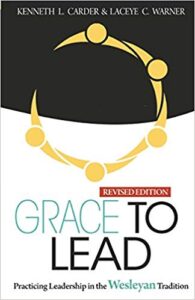Andrew C. Thompson ~ The Virtue of Pastoral Leadership

Note from the Editor: This week at Wesleyan Accent, as we scan, with grief, ongoing news from seeker-sensitive Protestant megachurches and Roman Catholic dioceses, we are reaching into our treasure trove of archives to reexamine different aspects of leadership. Our contributors over the years have written thoughtful, challenging reflections on leadership from a variety of perspectives.
I returned recently from a trip to the beautiful hill country of north Alabama. While there I spent a day in conversation with Methodist clergy from there about leadership in the church.
The questions we were grappling with are important for the future of any church in the Methodist family: What does Wesleyan pastoral leadership look like? Is there even such a thing?
I’ve been pondering these questions for a few years, since I first taught a seminary course called, “Models of Wesleyan Pastoral Leadership.” The idea of Leadership Studies is, of course, very much in vogue right now. That’s true for many different fields of endeavor — business, higher education, government, athletics, and non-profit work. Within the Wesleyan tradition, writing about church leadership has been going strong for several years. In 1999, Lovett Weems wrote  Leadership in the Wesleyan Spirit, which examined the leadership traits of John Wesley, Francis Asbury, and other early Methodists. Since then, books on church leadership written by self-conscious Wesleyans have proliferated: William Willimon’s Calling and Character: Virtues of the Ordained Life (2000), Adam Hamilton’s Leading Beyond the Walls: Developing Congregations with a Heart for the Unchurched (2002), and Kenneth Carder & Laceye Warner’s Grace to Lead: Practicing Leadership in the Wesleyan Tradition (2011), just to name a few.
Leadership in the Wesleyan Spirit, which examined the leadership traits of John Wesley, Francis Asbury, and other early Methodists. Since then, books on church leadership written by self-conscious Wesleyans have proliferated: William Willimon’s Calling and Character: Virtues of the Ordained Life (2000), Adam Hamilton’s Leading Beyond the Walls: Developing Congregations with a Heart for the Unchurched (2002), and Kenneth Carder & Laceye Warner’s Grace to Lead: Practicing Leadership in the Wesleyan Tradition (2011), just to name a few.
So is there anything we could really identify as Wesleyan Pastoral Leadership? I think we can identify a leadership approach that is distinctively Wesleyan, even if not uniquely so.
Think about this issue from the standpoint of conventional approaches to ethics. Duty ethics is focused on doing the right thing or making right decisions — ethics from the standpoint of rules. Consequentialist ethics emphasizes reaching the right outcome or emphasizing decisions and actions that are focused on achieving the most desirable ends. Virtue ethics shifts the focus away from decisions and outcomes, and toward the person involved in decision-making. This approach is most interested in the character of the decision-maker, believing that the most important factor in good ethical decision-making and action is the person him or herself.
If we look back at the example of John Wesley and the early Methodist movement, we will find some expressions of each of these major ethical approaches. The approach that might leap out at us immediately would be duty ethics. The early Methodists were, after all, great lovers of rules. The General Rules established the baseline expectations for how every Methodist would live within a local society. Wesley himself set down rule guidelines for everything from the regulation of the bands to the expectations of his preachers. All of this evidence might suggest that perhaps Wesleyan understandings of pastoral leadership are most closely related to duty ethics (at least if we tie the Wesleyan tradition to its origins in the 18th century).
There is, however, some reason to consider the place of consequentialist ethics in the early Methodist movement as well. After all, early Methodism was highly adaptable. Many of the institutional structures that developed (the class meeting, the conference, etc.) emerged in the context of the revival as opposed to being planned in advance by anyone. And the reasons for many of the structures coming into being at all were to serve the needs of the revival — such as local society organization, the deployment of preachers, or the needs of the poor. These early Methodists were mostly interested in salvation, understood as the redemption of both bodies and souls. They made all sorts of decisions based on that overriding interest in the end of salvation. So perhaps we should think about Wesleyan leadership as more tied to a consequentialist approach to ethical decision-making and action.
Then there is the approach of virtue ethics. Were Wesley and other early Methodists interested in the subject of character formation?
It turns out that this is very much the case. The formation of virtues within the soul was a topic that John Wesley was deeply interested in. His early sermon, “The Circumcision of the Heart” (1733) is a meditation on the progress of sanctification towards Christian perfection with reference to the virtues of humility, faith, hope, and love. For Wesley, a Christian account of the virtues ultimately becomes a description of sanctification itself.
When he was addressing the preachers under his authority in the “Large Minutes,” Wesley counseled them to emphasize the kind of habits in their daily lives that would build them up in the right way. Of course, they were to engage in the daily acts of ministry — “preaching and visiting from house to house.” But they were also to take time for spiritual disciplines, as he put it, “in reading, meditation, and prayer.” He understood that a good minister had to be truly good inwardly.
The similarity between the virtues and sanctification becomes especially clear when we grasp the connection between holiness and happiness. Holiness is a synonym for sanctification, which in the Wesleyan sense is seen as that state whereby our character comes to be defined by holy love. Happiness is a virtue concept — it is the eudaimonia of Aristotle, which is best described as that condition whereby human life is flourishing at an optimum level. For Wesley to link the two together — as he does explicitly — is to suggest that we only find true happiness when our lives have become marked by the holy virtues of faith, hope, and love.
There are some evidences of leadership via the approaches of duty ethics and consequentialist ethics in early Methodism. Those approaches were only ever utilized in an ad hoc way, though. What really counted for Wesley and other early Methodists was the formation of character in a leader, and right character can only come about through the kind of disciplined practice that leads to a virtuous life. A sanctified life. For leadership, a rightly formed character is what is truly foundational.
Like all institutions in our culture, the church is in a period of difficult transition. The tendency is to focus our energies on the institution, thinking that if we just get some type of organizational reform right then the church’s health will be restored. The early Methodists would point us in a different direction, though. Wesley once asked his preachers, “Why are we not more holy?” The answer he gave: “Chiefly because we are enthusiasts; looking for the end, without using the means.”
Leadership is a high calling, and it is a difficult calling. Those who are called to lead are also called to submit themselves to the kind of discipline that renders them worthy of being followed. If we want the church to be led well, we must press on in pursuit of those virtues that leadership requires.
Read more from Dr. Andrew C. Thompson here.